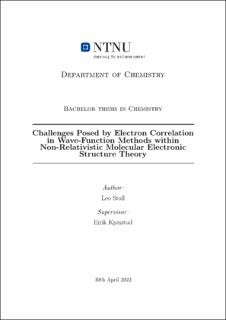Challenges Posed by Electron Correlation in Wave-Function Methods within Non-Relativistic Molecular Electronic Structure Theory
Bachelor thesis
Permanent lenke
https://hdl.handle.net/11250/3001616Utgivelsesdato
2022Metadata
Vis full innførselSamlinger
- Institutt for kjemi [1394]
Sammendrag
Utfordringer ved å beskrive elektronbevegelse i fler-elektron systemer under Born-Oppenheimer approksimasjonen innen ikke-relativistisk elektronstruktur teori illustreres ved ved diskusjon av utvalgte bølgefunkjonmetoder. Ved de få, men illustrative eksemplene Hartree-Fock teori, Coupled-Cluster teori og Multi-Configuration-Self-Consistent-Field teori, diskuteres viktigheten av elektronkorrelasjon, med hovedfokus på den elektroniske grunntilstanden. Behovet for en universell metode presenteres, og grunner for at Hartree-Fock, Coupled-Cluster og Multi-Configuration-Self-Consistent-Field ikke oppfyller kravene som stilles til en slik metode undersøkes. Til sist utforskes muligheter for å kombinere Coupled-Cluster og Multi-Configuration-Self-Consistent-Field for å konstruere en universell Multi-Reference-Coupled-Cluster metode. Challenges of describing electron motion in multi-electron systems under the Born-Oppenheimer approximation within non-relativistic electronic structure theory are illustrated discussing select wave-function methods. Using few, but illustrative examples, namely Hartree-Fock, Coupled-Cluster and Multi-Configuration-Self-Consistent-Field theories, the relevance of electron correlation is discussed, with emphasis on the electronic ground-state. The need for a universal method is presented, and ways Hartree-Fock, Coupled-Cluster and Multi-Configuration-Self-Consistent-Field methods fail to satisfy requirements to such a method are reviewed. Finally, outlooks of combining Coupled-Cluster and Multi-Configuration-Self-Consistent-Field theories to produce a universal Multi-Reference-Coupled-Cluster method are examined.
